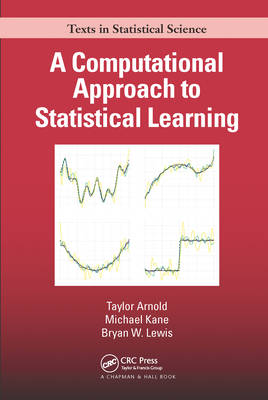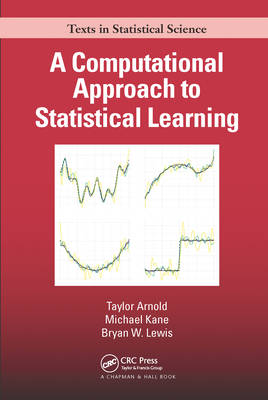
- Retrait gratuit dans votre magasin Club
- 7.000.000 titres dans notre catalogue
- Payer en toute sécurité
- Toujours un magasin près de chez vous
- Retrait gratuit dans votre magasin Club
- 7.000.0000 titres dans notre catalogue
- Payer en toute sécurité
- Toujours un magasin près de chez vous
Description
A Computational Approach to Statistical Learning gives a novel introduction to predictive modeling by focusing on the algorithmic and numeric motivations behind popular statistical methods. The text contains annotated code to over 80 original reference functions. These functions provide minimal working implementations of common statistical learning algorithms. Every chapter concludes with a fully worked out application that illustrates predictive modeling tasks using a real-world dataset.
The text begins with a detailed analysis of linear models and ordinary least squares. Subsequent chapters explore extensions such as ridge regression, generalized linear models, and additive models. The second half focuses on the use of general-purpose algorithms for convex optimization and their application to tasks in statistical learning. Models covered include the elastic net, dense neural networks, convolutional neural networks (CNNs), and spectral clustering. A unifying theme throughout the text is the use of optimization theory in the description of predictive models, with a particular focus on the singular value decomposition (SVD). Through this theme, the computational approach motivates and clarifies the relationships between various predictive models.
Taylor Arnold is an assistant professor of statistics at the University of Richmond. His work at the intersection of computer vision, natural language processing, and digital humanities has been supported by multiple grants from the National Endowment for the Humanities (NEH) and the American Council of Learned Societies (ACLS). His first book, Humanities Data in R, was published in 2015.
Michael Kane is an assistant professor of biostatistics at Yale University. He is the recipient of grants from the National Institutes of Health (NIH), DARPA, and the Bill and Melinda Gates Foundation. His R package bigmemory won the Chamber's prize for statistical software in 2010.
Bryan Lewis is an applied mathematician and author of many popular R packages, including irlba, doRedis, and threejs.
Spécifications
Parties prenantes
- Auteur(s) :
- Editeur:
Contenu
- Nombre de pages :
- 362
- Langue:
- Anglais
- Collection :
Caractéristiques
- EAN:
- 9780367570613
- Date de parution :
- 30-06-20
- Format:
- Livre broché
- Format numérique:
- Trade paperback (VS)
- Dimensions :
- 156 mm x 234 mm
- Poids :
- 526 g

Les avis
Nous publions uniquement les avis qui respectent les conditions requises. Consultez nos conditions pour les avis.






